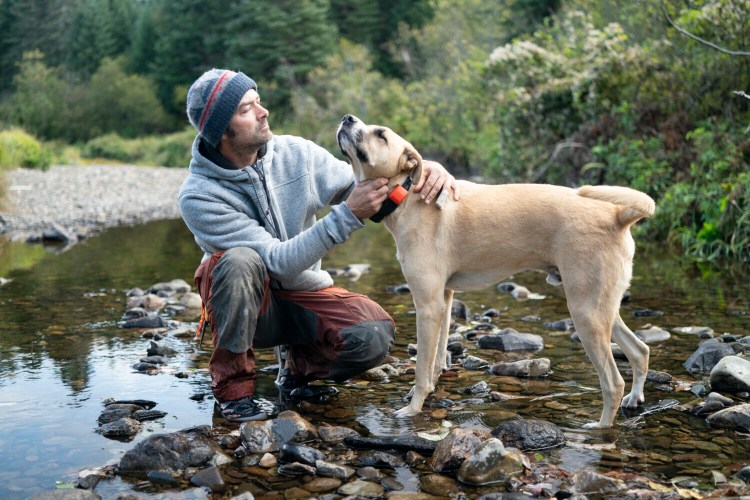“This is a Maine thing, but it’s really a story about how we find these things, and how it got to Maine.”
That’s Munjoy Hill resident and veteran TV producer Devon Platte of Film 45, who, along with Matt Reccow of Red Cow Productions, sent a cast of intrepid would-be survivalists (and their loyal canine best friends) into the Maine wilderness for the National Geographic reality series, “Called To The Wild,” the first six-episode season of which started airing this month. Filmed in and around rough-and-tumble Maine locations from Rangeley to Aroostook County, the NatGeo series pits these human-dog teams against the worst and wildest the Maine woods has to offer – at least thanks to Platte and Reccow.
Longtime friends and collaborators in the reality TV world (they met doing a food show in Morocco some 20 years ago), the two behind-the-scenes veterans were tasked with finding just the right rugged, isolated and picturesque terrain in which to strand “Called To The Wild’s” human-dog duos as they seek out safety from the unpredictable elements. And here I should note that, reality TV codes aside, there were a pair of veterinarians on set at all times along with the camera crew to ensure health and safety of the dogs. Assures Reccow, “There were daily rations for the dogs, but not the people.” Good to know, as we humans are much more OK with watching our fellow people suffer for our enjoyment.
It was Mainer Platte (executive producer of the Maine Mariners hockey reality show “Puckland”) whom Reccow credits with getting Maine some serious screen time as the series’ stark and beautiful setting, citing Platte’s many Maine connections and his time as executive producer of the Maine-set game warden Animal Planet series “North Woods Law.” Says Platte, “The company behind (fellow survival reality series) “Alone,” came to Matt, who works with them a lot, and said, ‘What about ‘Alone,’ but with dogs?’ But, even though ‘Alone’ typically films internationally, we wound up scouting right at the peak of COVID, and so international travel was out of the question.”
Enter Maine to the rescue, although not without some stiff competition from other states with large, undeveloped and suitably cinematic swathes of land such as Montana, Oregon and Northern California. In the end, though, it was Platte’s knowledge of those Maine North Woods (and the many, many permits and permissions necessary) that carried the day, with Reccow explaining, “Devon’s contacts were the key to opening up the door. He knew all the big landowners and the big parcels of land. He could drive up and take photos, and show first-hand just what was possible.”
For a show like “Called To The Wild” to trek into the Maine wilderness is an enormous undertaking, with Platte touting Maine’s unique environment – both natural and film production – as perfect for the series’ needs.
“Apart from cast and location, creative always needs water for any kind of survival show,” said Platte, with Reccow citing Maine’s abundance of everything from fish to game to fiddleheads, mushrooms and berries for the show’s increasingly chilly and hungry participants to nibble on. (The series wisely didn’t film in the dead of a Maine winter, but both Platte and Reccow note that fall in Maine is plenty challenging enough.)
“Plus, we need extreme locations that are still within some sort of driving distance to civilization, somewhere with hotels or camps for dozens of people to stay, airports, etc.,” explained Platte about the series, which filmed through the late summer and fall of 2020. “It’s sort of like bringing the circus to town.”
As Platte and Reccow stress, that show business circus provides benefits to all parties, something Mainer Platte is particularly proud of.
“It trickles down,” Platte said. “A show is put together from the top down, but to get to bring it to Maine is good for the local crew members, plus local hotels, restaurants, rental agencies.”
“Maybe more important, though,” stressed Reccow, “it shows companies like ITV, that are based out of New York, that filming in Maine is possible, and cost-effective. Shipping things in a U-Haul to Maine is a lot less expensive than flying everything to L.A. I think it’s fair to say that another project or two might come Maine’s way thanks to Devon’s work, and that Maine might enter into the conversation earlier going forward.”
Here, admittedly with prompting from me, Platte and Reccow did stress how Maine’s continued refusal to enact tax incentives for film production in Maine works against that potential influx of movie industry film and cash.
“Hell yes, that would help,” Platte said, laughing. “Over the years, Matt and I have worked on various projects that were able to take advantage of the best tax incentives. There’s not a production company out there that works with us that doesn’t take that into account.”
Tax break interlude over, both Reccow and Platte note that the viewership for reality survival TV is up considerably in the past few years.
“There’s so much being made, it’s ridiculous,” said Reccow, speculating that our own pandemic isolation might be driving our desire to virtually set out into the big, wide world outside our door. Preferably with a faithful dog companion snuggled up on the sofa next to us.
You can watch “Called To The Wild” on the National Geographic channel or stream it through certain providers on the National Geographic website.
Send questions/comments to the editors.


